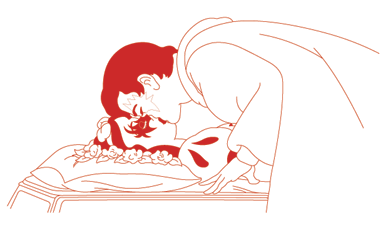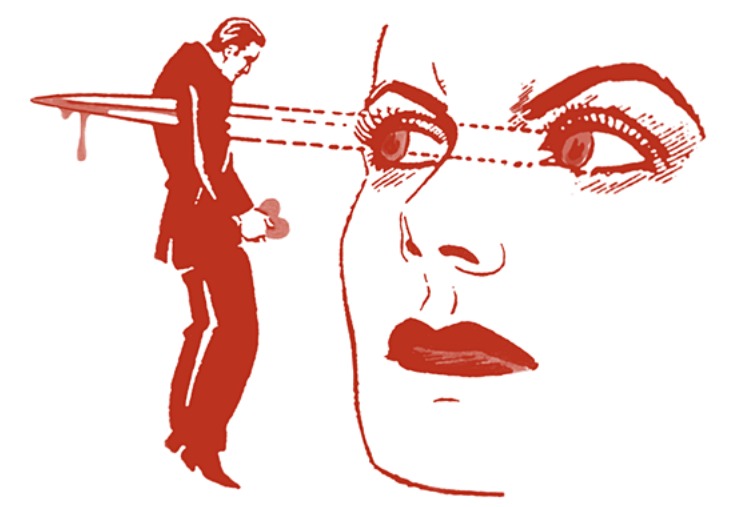This is the editorial note to TNI Vol. 13: <3. View the full table of contents here.
Subscribe to TNI for $2 and get <3 (and free access to our archive of back issues) today.
***
With its isolating interfaces, the Internet is — much like sex itself — no place for intersubjectivity. Maybe that’s why it has lent itself so well to dating. With Issue 13, the New Inquiry Magazine looks at looking for love in all the wrong places. Like, say, in books: Rob Horning reviews Love in the Time of Algorithms, which poses the economization of love as inevitable, along with the end of monogamy. But are people really so helplessly altered by online romance? After all, dating sites still generate actual dates, bringing together actual people: vulnerable, unpredictable, ultimately uncommodifiable. As Whitney Erin Boesel notes, online dating doesn’t differ profoundly from dating pre-Internet; the sites may offer speed and volume and “efficient” encounters as bait, but users aren’t necessary taking it. The fastest path to partnership, she concludes, isn’t necessarily the most appealing one.
In “Whips with Friends,” Helena Fitzgerald examines BDSM dating sites, wondering how well sex that thrives on secrecy can survive the exposure. Hannah Black chronicles romance grown too secret, finding a parable of surveillance in the story of an undercover cop who falls in love while on the job. Of course, not every stranger is a threat, as Adrian Chen points out in his piece on the oldschool social-networking site Makeoutclub.com, which had the virtue of not being explicitly dating-oriented. On that site, sexual tension was high because ambiguity lived: Other people’s intentions were never foreordained.
Yet ambiguity can be crazy-making. With Camille Paglia as her guide, Natasha Vargas-Cooper reminds us that romantic obsession can be fascistic — at bottom of the urge to clarify things is the impulse to dominate. Getting free sometimes means joining up: Mandy Stadtmiller, in conversation with Mike Thomsen, describes identifying as a sex and love addict. And in “The Withdrawal Method,” Erwin Montgomery argues that the only way out of the marketplace of desire is to politely refuse both relationship “work” and the equal and opposite labor of being a player: in other words, to emulate Bartleby, who simply “prefers not to.”
What would passive resistance do to online dating? We looked to Melville for an answer.

***
Bartlebea the Dater
At first, we did an extraordinary quantity of dating. As if long famished for someone to date, we seemed to gorge ourselves on candidates. There was no pause for digestion. We ran a day and night line, dating by sunlight and by candlelight. We should have been quite delighted with our application, had we been cheerfully industrious. But we dated silently, palely, mechanically. . .
In our haste and natural expectancy of instant compliance, we favorited a comely profile with finger tense, and cursor hovering, somewhat nervously ready, so that our date might snatch our meaning and proceed to business without the least delay.
Imagine our surprise, nay, our cons-ternation, when, without favoriting us back, our date, in a singularly mild, firm email, replied, “I would prefer not to.”
We sat awhile in perfect silence, rallying our stunned faculties. Immediately it occurred to us that our eyes had deceived us, or our prospective date had entirely misunderstood our meaning. We repeated our request in the clearest tone we could assume; but in quite as clear a one came the previous reply, “I would prefer not to.”
“Prefer not to,” echoed we, rising in high excitement. “What do you mean? Are you moonstruck? We want you to date us—here, rate us,” and we thrust our photo towards her.
“I would prefer not to,” said she.
With any other individual we should have flown outright into a dreadful passion, scorned all further words, and thrust the person ignominiously from our presence. But there was something about this individual that not only strangely disarmed us, but, in a wonderful manner, touched and disconcerted us. We began to reason.
“This is your own loneliness we are about to assuage. It is labour saving to you, because one date will answer for your entire week. It is common custom. Every human is bound to date. Is it not so? Will you not speak? Answer!”
“I prefer not to,” our date replied in a flutelike tone.
“You are decided, then, not to comply with our request—a request made according to common usage and common sense?”
Our date briefly gave us to understand that on that point our judgment was sound. Yes: the decision was irreversible.
. . . Shall we acknowledge it? The conclusion of this whole business was that it soon became a fixed fact of the website, that a pale young dater had a profile there; that she examined other profiles at the usual rate of a folio an evening; but she was permanently exempt from going on dates; and that even if entreated to take upon her such a matter, it was generally understood that she would “prefer not to”—in other words, that she would refuse point-blank. . .

